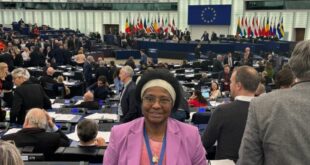The European Commission will recommend to EU leaders to move Brexit talks into the next phase, Commission president Jean-Claude Juncker said Friday (8 December) morning at a joint press conference with British Prime Minister Theresa May.
Juncker said “sufficient progress” has been made in divorce issues to move to talks on the future relations. “We have now made the breakthrough we needed,” Juncker added.
That breakthrough came early in the morning, when the British prime minister travelled to Brussels to meet with Juncker and EU Council president Donald Tusk.
“Today’s result of course is a result of a compromise,” Juncker said.
May added the deal required “give and take” on both sides, but said the deal is “fair” to the British taxpayer.
May had also travelled to Brussels on Monday, but negotiations dramatically broke down, when it emerged May’s allies in Northern Ireland, the Democratic Unionist Party (DUP) had refused to sign up to the agreement fearing it could tear Northern Ireland apart from the rest of the UK.
May said Friday the government will preserve the economic and constitutional integrity of the UK, while there would be no hard border on the island of Ireland.
“This is a very good day for Ireland, North and South. We achieved the goals we set out to achieve in phase one,” an Irish government spokesman said on the deal.
Joint report
Negotiators have now concluded a joint report, which will be basis for the withdrawal agreement.
The report sets out what has been agreed on the three key issues of phase one of the talks: citizens’ rights, the Irish border and the divorce bill.
On the question of citizens’ rights Theresa May said that the agreement guarantees the rights of three million EU citizens in the UK “enshrined in UK law and enforced by British courts”.
The UK courts could turn to the European Court of Justice (ECJ) for 8 years. Once they ask the ECJ for a ruling, UK courts would have to follow the EU’s top court’s advice.
The two sides agreed on the still outstanding issue to allow for family reunifications. The UK pledged a registration system for EU citizens that is “transparent, smooth and streamlined”, a key priority for the European Parliament.
Juncker said EU citizens’ rights “will remain the same” after Brexit.
On the Irish border issue, which caused Monday’s talks between Juncker and May to fall through, the UK recalls its commitment to the avoidance of a hard border, including any physical infrastructure or related checks and controls.
In case there is no deal at the very end of Brexit negotiations, the UK will maintain “full alignment” with the rules of the single market and customs union, the joint report says.
The report also adds, pleasing May’s DUP allies in the Westminster parliament who she relies on for a majority that the UK “will ensure that no new regulatory barriers develop between Northern Ireland and the rest of the United Kingdom”.
It adds that in the absence of an overall Brexit agreement, “the United Kingdom will propose specific solutions to address the unique circumstances of the island of Ireland”.
On financial settlement, the UK commits to pay its share of the current EU budget.
The UK will also pay its share in the Turkey Fund and the European Development Fund. Its paid-in capital and share in the European Central Bank and the European Investment Banks will be reimbursed.
Now diplomats from the EU-27 countries will agree on the guidelines that set out the basis for the talks on the second phase.
EU leaders meet next week for a regular EU summit, where they will decide to move talks onto the next phase, adopting those guidelines. The next phase consists of talks on a trade deal between the UK and EU, a transition period, and future relations in general.
Juncker said he is confident EU leader will give agree to move talks forward.
The divorce agreement will be based on the joint report and will need to be ratified by the UK and EU parliament.
© EUobserver
 THE AFRICAN COURIER. Reporting Africa and its Diaspora! The African Courier is an international magazine published in Germany to report on Africa and the Diaspora African experience. The first issue of the bimonthly magazine appeared on the newsstands on 15 February 1998. The African Courier is a communication forum for European-African political, economic and cultural exchanges, and a voice for Africa in Europe.
THE AFRICAN COURIER. Reporting Africa and its Diaspora! The African Courier is an international magazine published in Germany to report on Africa and the Diaspora African experience. The first issue of the bimonthly magazine appeared on the newsstands on 15 February 1998. The African Courier is a communication forum for European-African political, economic and cultural exchanges, and a voice for Africa in Europe.

































